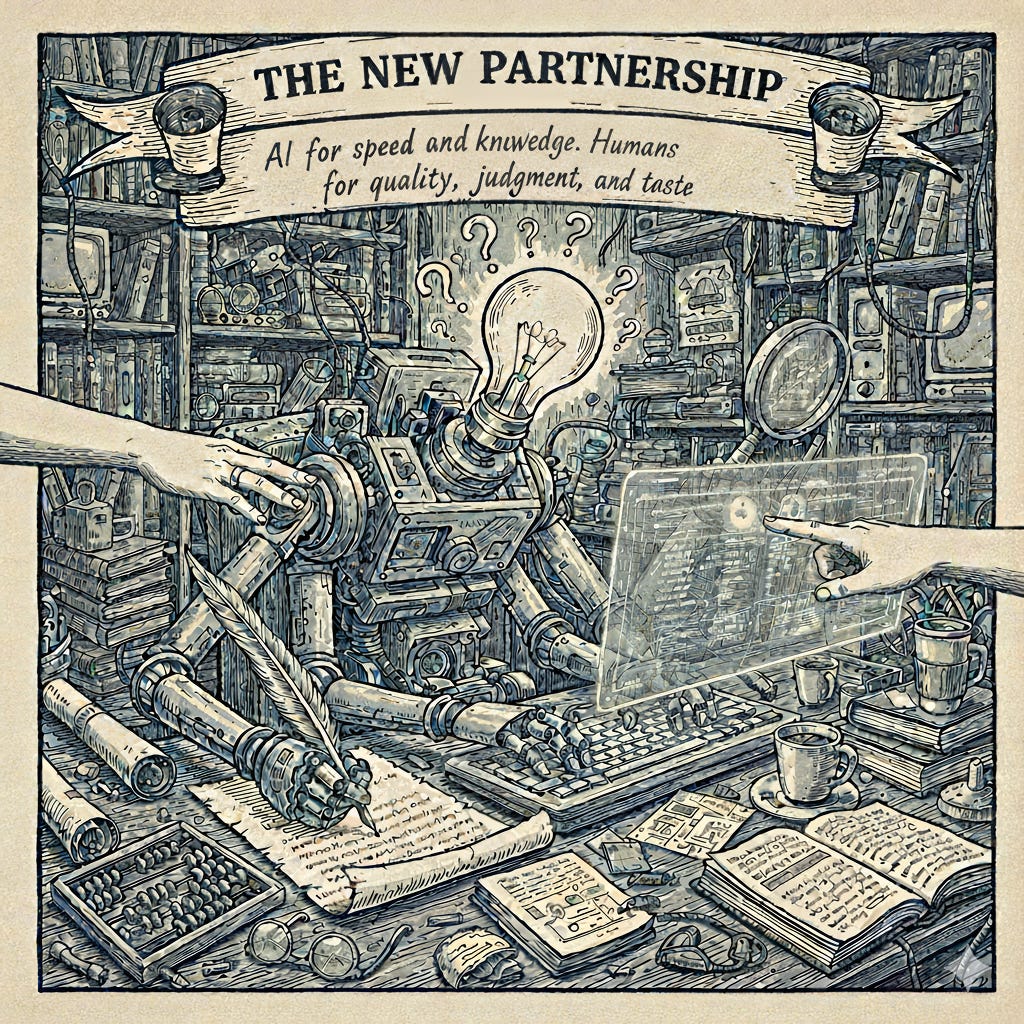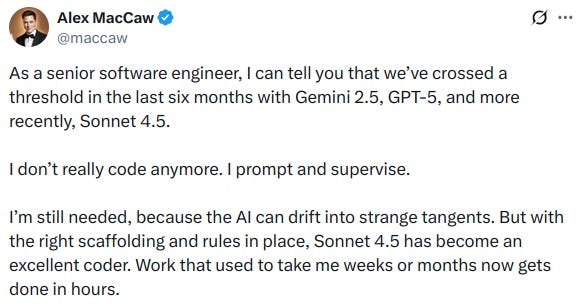Are 90% of Programs Being Written By AI?
Even if you're not a programmer, the answer to this question will change your world
No, So Why Bother?
There are 3 objections to the title of this post:
90% of the code (in, for example, Infosys) is definitely not being written by AI, so Betteridge’s Law clearly applies in this case
AI is evolving so fast, that nobody can predict the future, even in the short-term, so why bother
Most of you are not programmers, so why bother
Let’s answer these in reverse order.
#3: Even if you are not a programmer, this is something you want to keep an eye on, because programming is a big part of the economy that you are in, and a change of this magnitude will affect you, directly or indirectly.
#2: AI is a tsunami that is going to disrupt your world. And having slightly more awareness of how the world is changing is going to be the difference between drowning and being able to surf the wave. Because you don’t have to run faster than the bear, you just have to run faster than the guy next to you.
Predicting the Present
As far as AI is concerned, new models are being released so fast, and their capabilities are improving so fast, that most people’s mental models haven’t yet caught up. They’re still stuck using ChatGPT to write emails for them.
Forget about predicting the future; most people aren’t able to predict the present.
Most people aren’t aware of what is already happening. Just having a clear picture of what is already happening will help you outrun the person next to you because the person next to you doesn’t know.
The rest of this post is about #1. And not what’s happening in Infosys, but what’s happening at the cutting edge (and will happen everywhere else later).
In 2013, Chris Dixon said, “What the smartest people do on the weekends is what everyone else will do during the week in ten years.” This is true with one small change—since the launch of ChatGPT, all the timelines have been compressed, so “what everyone else will do” is going to happen much earlier than 10 years.
Later in the post, I have some data points about what the smartest people are doing. But before that, here’s my own experience.
The 3 Ways of Using AI for Programming

And even before that, you need to understand the different ways in which AI can be used for programming. There are 3 different ways:
Going to the ChatGPT/Claude/Gemini app/website and asking to write some code, then copy-pasting that code into your computer and running it. Most people have some familiarity with this.
Using an AI-enabled IDE, like Cursor or Copilot. An IDE is an Integrated Development Environment where you write code, then you can compile and run the code, and debug it in case of errors, or automatically run unit tests. This is the most common way of doing programming, and now with AI-enabled IDEs, this has gotten supercharged, because you can open up any file in your code, select part of it, and give instructions in English to the AI on how you want it modified. You can even give it bigger tasks, like adding an entire new feature to the program, which can involve making changes to multiple files. Most programmers have heard of this, but the number who have used it still remains low.
Using an agent, like Claude Code from Anthropic, or Codex CLI from OpenAI/ChatGPT, or Gemini CLI or Jules from Google. These are programs that you download to your computer, and then you interact with them by typing in English (or just speaking in English through your mic). They are capable of much more than just programming:
They can write programs, compile, and execute
They can also download other software packages, install and run them
They can read documents, log files, configuration files, and other information on your computer
They can use programs and tools. For example, they can use your Email program to read emails, search and analyze them, and even send emails. They can use your calendar to both read and analyze existing entries and add new entries. They can use Excel, MS Office, and browsers. They can create new tools by writing programs and running them.
In short, they are quite powerful, and there are some examples of how to use them later in this article. But most people I know have not used this, even senior programmers. Most aren’t even aware of their capabilities.
How I Use AI for Programming
Anyway, a friend posted this on one of my WhatsApp groups and asked whether anyone had a similar experience:
Yes, I definitely have the same experience.
Of the 3 types of AI-assisted coding I listed above, I now mostly do #2 and #3. I don’t do #1 anymore. And I definitely don’t write lines of code by hand anymore.
I regularly create quick-and-dirty apps and scripts. Many more than I used to earlier, because now they take much less effort. These are fully vibe-coded with Claude Code. I rarely even look at the code. (This corresponds to #3 above.)
And for making changes to my company’s software product (i.e., where the quality of the code is very important because of long-term maintainability), I use Cursor. Here, I’m much more hands-on. But even here, I almost never write any code myself. I have Cursor do it, but I read all the code and I make it fix things that I know can cause long-term tech debt (or just inelegant code). More details of this are contained in Armin’s post below. (This corresponds to #2 above.)
But the last part of that tweet is absolutely true: I’m much more ambitious about what I take on, and I can do in days what would have taken me weeks earlier.
Claude Code Is More Than Just Programming
As suggested earlier, the agents, Claude Code and Codex CLI, can be used for much more than just simple programming. These are some of the things that I’ve actually used Claude Code for:
My Wi-Fi keeps dropping; monitor the logs and figure out the root cause of the problem
Go through all the documents I’ve downloaded in the “Vietnam” folder on my GDrive and create a single printable PDF of the documents I’ll need in the order I’ll need them. Create a different PDF for each traveller (for example, visas are different for each)
Here’s a link to a Twitter thread where each tweet contains a video. Download all the videos, extract the audio, transcribe to text, put in a single document, and then give me a summary...
Figure out all the videos in my YouTube channel, download their titles, descriptions, and transcripts. Create a local database of them all. Then tell me which video talks about the use of “FOMO” in marketing
The Bluetooth earbuds that are currently connected, please rename them to `Navin 1+Buds`” (this can be surprisingly difficult to do manually on Linux)
There are a bunch of Excel spreadsheets in this folder; some of them are invoices. Figure out which ones are from the last financial year and create a new spreadsheet with a summary: one line per invoice.
And a bunch of other things.
What are Other Smart People Saying?
Armin Ronacher has written a detailed post about how 90% of the code he now writes comes from AI. And Armin isn’t just any other programmer. He has written major packages that are used by people all over the world (Jinja, Flask, Sphinx, Pygments, Babel, and many more), so his opinions are worth taking seriously. Here are the important points he makes:
He was skeptical earlier but is now a believer
He reviews every line of the code because he doesn’t trust the AI
He has to override the AI on a lot of issues like high-level architecture, code reuse, elegant code, inappropriate comments, etc. In short, AI copies patterns from average programmers across the internet, which is not what you really want, and as an experienced senior programmer, there is a lot of guidance you have to give the AI in ensuring that the code that gets written is good, maintainable code with low technical debt.
He makes very different decisions now because things that used to be hard earlier are easy. For example (non-programmers can skip this sentence), earlier he used ORMs to manage databases because writing SQL directly was a pain, but now he skips ORMs and has the AI write the SQL to manipulate the database directly because the AI is so good at SQL (and having direct access to the SQL is great for debugging, performance, and other things.)
If you are a programmer, you should read the whole post.
As Trump would say, Many Such Cases: link #1, link #2, link #3, link #4.
AI Changes Everything
3 months back, Armin wrote, AI Changes Everything. Here are some examples of what AI changes in programming.
Aaron Levie, CEO of Box.com, points out that they now do many more projects and try many more approaches because of AI:
One of the cool things with AI agents in knowledge work is that it blows up the sunk cost fallacy that we have with projects.
When you start on a task, whether it’s code or a product design or a research project, you inevitably constrain yourself based on previous steps and decisions.
This sets up an inevitable path dependence on future decisions. It’s only natural that if you’ve spent a bunch of time working on something, you’re going to remain committed to that direction unless there is overwhelming evidence to go in a different direction.
By making the cost of experimentation go to nearly zero, AI agents let you try many different methods of solving the same problem. If you don’t like a direction, you can just throw it away and start over.
It will be interesting to see how much work subtly changes because we no longer have this constraint.
Simon Willison, creator of Django, Lanyrd, and other popular programs, points out:
I’m finding it’s broken my ability to make high level decisions about projects
I have 20+ years experience of deciding what to build based on how long/frustrating I think the project will be... but with coding agent assistance many of the previously frustrating bits are fast now but there are new frustrations to deal with instead which I find much harder to estimate



Days are coming when you (human) just have to give business requirement and ai will generate machine code.. Wonder what will happen to Java camp vs Go Camp .. ?